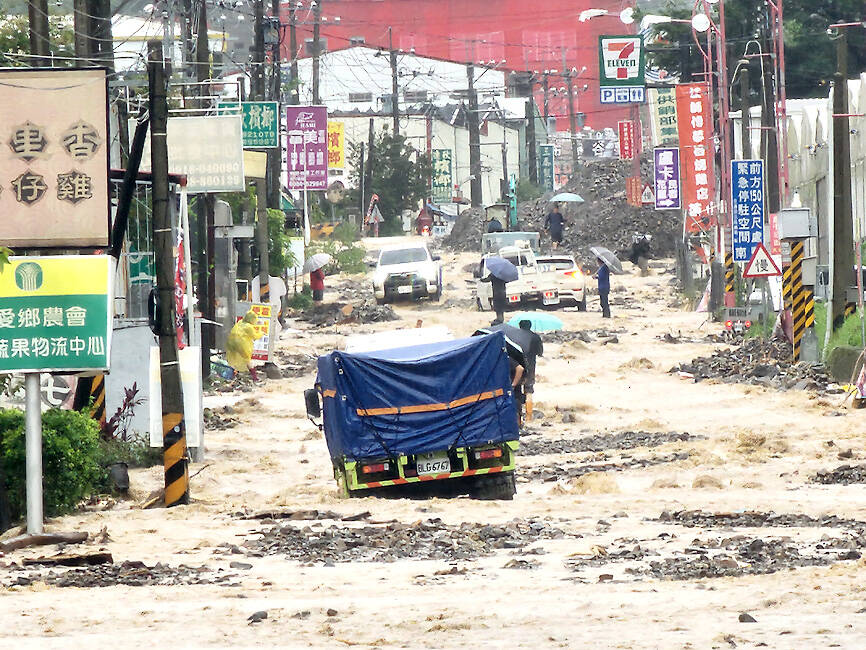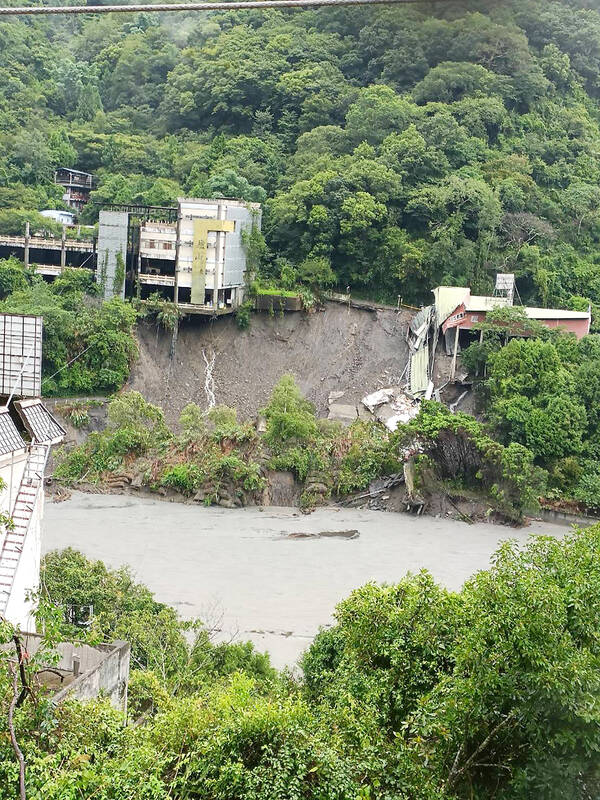Heavy rain in the wake of Typhoon Khanun lashed mountainous areas of Taiwan yesterday, causing floods and landslides that blocked roads and stranded hundreds of people as authorities rushed to restore transportation links.
The Directorate-General of Highways said that rain in Nantou County led to multiple mudslides and landslides along Provincial Highway No. 14, the No. 14A branch from Wushe (霧社) to Dayuling (大禹嶺) in Renai Township (仁愛), and on township roads 71, 83, 85 and 89.
Renai had 939.5mm of rain in a 72-hour period, Central Weather Bureau (CWB) data showed.

Photo: Tung Chen-kuo, Taipei Times
Aside from Jhongjheng (中正), Hujhu (互助) and Nanfeng (南豐) villages, which were still accessible, other places on the affected roads are like islands, and risk running short on supplies, including fresh water, officials said.
Nantou County Commissioner Hsu Shu-hua (許淑華), during an inspection of the Nanfeng section of Provincial Highway No. 14 yesterday morning, said that the Nantou County Government has asked the Executive Yuan to work with the Ministry of National Defense to have military personnel ready to assist with disaster relief efforts.
The Reservist Command has about 300 personnel it could mobilize in the region and its commander was among those in the group making the inspection.

Photo courtesy of a reader
A gas station in Renai was buried by landslides and the Lilai Hot Spring Hotel (麗來溫泉飯店) in the township’s Lushan Hot Springs (盧山溫泉) area was in danger of collapse as part of its foundations had been washed away, officials said.
The county government said that experts would assess whether the resort is safe to operate and, if not, determine the best way to demolish the building.
A garage in the Lushan Hot Springs area, which has not been used for more than a decade due to landslide concerns, also lost part of its foundation in a landslide, officials said.
National Chi Nan University president Wu Tung-hsing (武東星) said that the institution has offered the use of air-conditioned graduate student dormitories for locals displaced by the typhoon, especially people from Nanfeng and Chungyang (春陽) villages and the Lushan area.
In Miaoli County, widespread flooding was reported in Sanyi (三義) and Yuanli (苑裡) townships, prompting the local fire bureau to dispatch personnel to rescue people trapped in homes or vehicles.
Up to 303 households in Jhunan Township (竹南) lost power. Electricity was restored later in the day, officials said.
Trees and utility poles fell in Hsinchu County, blocking County Road No. 122 near the 48.5km marker in Wufeng Township (五峰).
In mountainous districts of Kaohsiung, more than 900 residents were evacuated as a precautionary measure following torrential rainfall.
Kaohsiung’s Namasiya District (那瑪夏) had accumulated more than 210mm of rain in 24 hours as of 9:30am yesterday, data from weather stations showed.
With a combination of southwesterly wind and gusts from the extremities of Typhoon Khanun, monitoring stations in Kaohsiung, as well as Pingtung, Miaoli and Chiayi counties, had each recorded more than 200mm of rain in the 12 hours to noon yesterday, the CWB said.
Heavy rain was forecast to continue over the weekend, although at a reduced level, it said, adding that warnings remained for landslides in mountainous areas in central and southern Taiwan.

The CIA has a message for Chinese government officials worried about their place in Chinese President Xi Jinping’s (習近平) government: Come work with us. The agency released two Mandarin-language videos on social media on Thursday inviting disgruntled officials to contact the CIA. The recruitment videos posted on YouTube and X racked up more than 5 million views combined in their first day. The outreach comes as CIA Director John Ratcliffe has vowed to boost the agency’s use of intelligence from human sources and its focus on China, which has recently targeted US officials with its own espionage operations. The videos are “aimed at

STEADFAST FRIEND: The bills encourage increased Taiwan-US engagement and address China’s distortion of UN Resolution 2758 to isolate Taiwan internationally The Presidential Office yesterday thanked the US House of Representatives for unanimously passing two Taiwan-related bills highlighting its solid support for Taiwan’s democracy and global participation, and for deepening bilateral relations. One of the bills, the Taiwan Assurance Implementation Act, requires the US Department of State to periodically review its guidelines for engagement with Taiwan, and report to the US Congress on the guidelines and plans to lift self-imposed limitations on US-Taiwan engagement. The other bill is the Taiwan International Solidarity Act, which clarifies that UN Resolution 2758 does not address the issue of the representation of Taiwan or its people in

SHIFT: Taiwan’s better-than-expected first-quarter GDP and signs of weakness in the US have driven global capital back to emerging markets, the central bank head said The central bank yesterday blamed market speculation for the steep rise in the local currency, and urged exporters and financial institutions to stay calm and stop panic sell-offs to avoid hurting their own profitability. The nation’s top monetary policymaker said that it would step in, if necessary, to maintain order and stability in the foreign exchange market. The remarks came as the NT dollar yesterday closed up NT$0.919 to NT$30.145 against the US dollar in Taipei trading, after rising as high as NT$29.59 in intraday trading. The local currency has surged 5.85 percent against the greenback over the past two sessions, central

US Indo-Pacific Commander Admiral Samuel Paparo on Friday expressed concern over the rate at which China is diversifying its military exercises, the Financial Times (FT) reported on Saturday. “The rates of change on the depth and breadth of their exercises is the one non-linear effect that I’ve seen in the last year that wakes me up at night or keeps me up at night,” Paparo was quoted by FT as saying while attending the annual Sedona Forum at the McCain Institute in Arizona. Paparo also expressed concern over the speed with which China was expanding its military. While the US